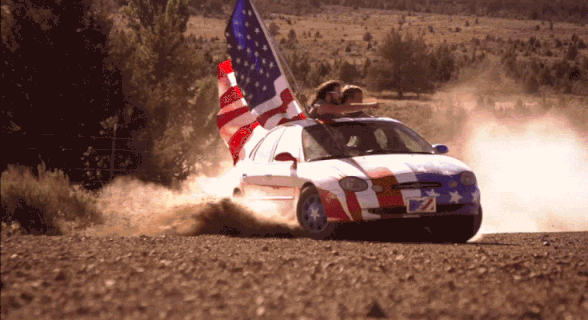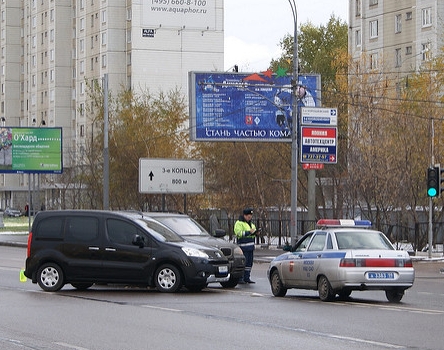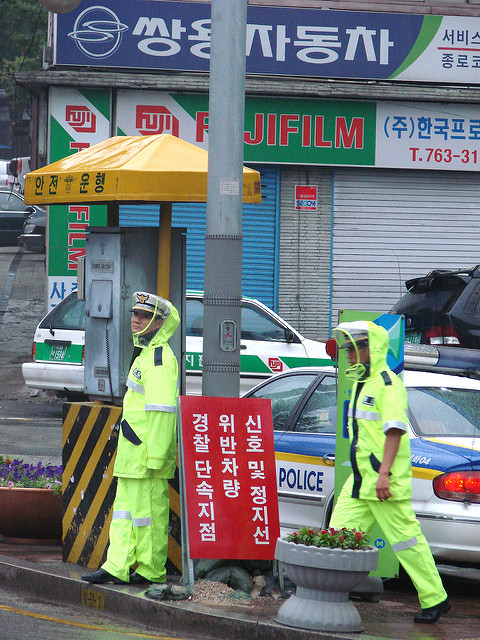Source: GIPHY
The United States is known for its enthusiastic love of American football, for popularizing the juicy hamburger, and for its all American privilege of freedom for all. What the US can't proudly brag about however are its citizens' bad driving habits, commonly characterized by cell phone usage and the consumption of snacks and drinks while behind the wheel. The frequency of car accidents on US roads is constantly in the news. In fact, ABC News reported that there were over 41,000 deaths on American roads in 2015 alone. As tragic as this statistic is and as commonplace a stereotype about bad American driving is, surprisingly, American drivers are only in the middle of the pack when it comes to road safety.
Perhaps it's due to different driver’s license requirements and road organization from country to country, that many other countries come out on the better side of traffic fatality statistics than the US. This may especially be because distracted driving is not as common in these countries as it is in the United States. Germany in particular comes out on top as a safer driving country than the US despite the fact that their road speeds regularly reach 140 mph on the autobahns. Distracted driving is a danger that millions of Americans participate in daily, that may lead to severe injuries or traffic fatalities. However, because German drivers tend to obey road rules more than Americans, and are less likely to be distracted by activities that take their eyes off the road when they are traveling at such high speeds, they are generally safer drivers.
Another reason Germany has more safe drivers may be due to the training Germans receive prior to becoming certified to drive. In Germany, there is a more difficult path to earning a driver’s license, involving a tougher written test, and required road tests in four different types of driving environments before allowing people to get a driver’s license, at age 18. On the other hand, each US state has their own age requirements for receiving a license, typically allowing teens to becoming licensed at age 16, following driver’s education classes and a basic road test. On top of stricter German license requirements, new drivers in Germany are essentially on probation for two years and in the event that they receive a traffic infraction, are booted back to driving classes.
Even stricter than Germany, Japan carefully polices written and road tests, only allowing drivers to skip their road test if they take a $2,500 driving course. The country is so specific on their driving requirements that, coupled with excellent public transit systems, many people avoid driving altogether. Then there is Iceland, which requires driving in snow and ice to be a part of the road test. Some US States, including Michigan, could benefit from adding this type of practice to their road tests for optimal winter driving safety!
Great Britain also appears to have safer drivers than in the US, possibly because the country has fewer freeways going through city centers than American cities do. This means that there are fewer high speed auto collisions as a whole. Heavy congestion in British cities also doesn’t allow many people behind the wheel in Great Britain to be able to get up to the speeds typically needed for fatal collisions. Andrew Howard, head of road safety for Great Britain says, “Our plummet in road deaths in recent years has been particularly in urban areas. You now can’t get up the speed to have them."
The famous British 'stiff upper lip' has also been attributed as a reason that car accidents are not as prevalent in Great Britain, as British drivers maintain their emotions and don't exhibit aggressive driving behavior, which in the US usually leads to road rage car accidents. An American expatriate living in London for the past 11 years explained, “You still have very much more courtesy and abiding by the rules in England. Someone will go zipping by at 100 [mph] , but they’ll do it in the appropriate lane."
While many countries have better safe driving records than America, there are still others that have worse car crash statistics. Unlike the other European countries mentioned in this article, Portuguese streets are almost twice as deadly as American roads. Turkey's driving conditions were described in a US State Department 'driver safety briefing' as, “pedestrians seemingly completely oblivious to oncoming traffic … vehicles backing up (in reverse) on exit ramps and on main highways … [and] oncoming drivers who play inscrutable light games, flashing and flashing whether you have your ‘brights’ [high beams] on or not.”
Perhaps worse than bad driving skills are the bad behaviors of Russian drivers who often bribe the police to get out of traffic tickets and driving under the influence of alcohol, and to drive unlicensed vehicles. Sergius Morenc, an ABCNEWS correspondent in Moscow, said, "there are, of course, standards and rules to be followed, but nobody follows them...If somebody breaks down, say, in the fast lane, he will take his spare wheel out or start working on the engine where he stopped."
Finally, the United States still has safer roads than South Korea, the worst country to drive in, because highways are desperately in need of repair due to constant car accidents which occur when roads are congested.
So, the truth comes out: Americans are not really the worst drivers in the world. But, stereotypes are hard to shake, which is maybe why many Europeans still wonder if Americans are the worst drivers. Nevertheless, the US could do with less distracted driving driving car accidents. Americans should stop participating in lengthy group chats, stop finessing their Pandora playlists, or eating a three course meal while in the driver’s seat. Speedy driving also needs to be reduced in order to have safer American roads and to reduce the number of fatal speeding car collisions. Overall, driving policies are criteria that vary no matter where one is in the world, but it is the need to travel between destinations that unites all people to rally for vehicle safety.
Driving is a universal action. Humans also universally display tendencies of speeding, distracted driving, and other actions that may lead to dangerous motor vehicle accidents. If you or someone you know has been involved in a car accident and call The Michigan Law Firm, PLLC. We offer free consultations for victims of motor vehicle collisions. Contact us today, at 844.4MI.FIRM.








